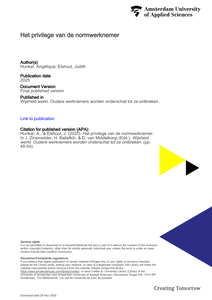Little is known about the link between fatherhood and reoffending among people released from prison. This study examined the association between fatherhood, residential status, and registered reconviction rates using data from a Dutch pre-trial prison cohort sample (N = 845, 42.5% fathers). The results show that fathers who co-resided with a partner and children 6 months after release from prison were significantly less likely to be reconvicted 18 months after release than non-fathers and fathers who did not reside with a partner and children. This paper concludes that fathers’ larger family context and reoffending risk factors need to be viewed in conjunction to understand the relationship between fatherhood and reoffending after release from prison.
DOCUMENT
In de helft van de Surinaamse en Antilliaanse gezinnen in Nederland ontbreekteen vader. Dit artikel bespreekt de achtergronden en mogelijke effectendaarvan en de manier waarop vaders uit deze groepen zelf tegen hunrol als vader en het grote aantal afwezige vaders aankijken. Daarbij ligt hetaccent op Afro-Surinaamse vaders. Een belangrijke vraag die in het artikelwordt behandeld is hoe vaderschap in Afro-Caribische kring te versterken.Enkele recent gestarte initiatieven rond versterking van vaderschap in Amsterdamworden daartoe kort uitgelicht.
DOCUMENT

Roughly half of all men in prison are fathers of minor children. Despite the high prevalence of fatherhood in prisons, little is known about imprisoned fathers’ needs regarding fatherhood and family relationships. In prisons for men, limited attention is given to men’s roles as fathers and the difficulties they and their families encounter. Prison policies generally prioritise safety, security, and good order rather than promoting men’s identities as fathers and supporting families experiencing paternal imprisonment.
DOCUMENT
WHAT IS KNOWN ON THE SUBJECT?: The combination of coping with their mental health problems and caring for children makes parents vulnerable. Family-centred practice can help to maintain and strengthen important family relationships, and to identify and enhance the strengths of a parent with a mental illness, all contributing to the recovery of the person with the mental illness. WHAT THIS PAPER ADDS TO THE EXISTING KNOWLEDGE?: Taking the strength and the opportunities formulated by parents themselves as a starting point is fairly new. Parents with severe mental illness find strength for parenting in several ways. They feel responsible, and this helps them to stay alert while parenting, whereas parenthood also offers a basis for social participation through school contacts and the child's friendships. Dedication to the parent role provides a focus; parents develop strengths and skills as they find a balance between attending to their own lives and caring for their children; and parenting prompts them to find adequate sources of social support. In this study these strategies were found to be the fundamentals of recovery related to parenting. WHAT ARE THE IMPLICATIONS FOR PRACTICE?: Nurses can support and coach patients who are identified as parents, and self-chosen parenting related goals are set and addressed. A family-focused approach by nurses can be used to prevent problems for children and their families, identify their strengths as well as vulnerabilities, and address the challenges to build resilience.ABSTRACT: Introduction Understanding of the problems of parents with mental illness is growing. Gaining insight into strategies for parenting, while taking the opportunities formulated by these parents themselves as a starting point is fairly new. Question What are the strategies of parents with a mental illness to be successful? Method Experiences of 19 mothers and eight fathers with a mental illness were explored with in-depth interviews. Data were content analysed, using qualitative methods. Results Next to feelings of inadequacy, interviewees also describe how children enrich and structure their lives and are not only a burden but serve as distraction from problems. Developing activities that interest both child and parent provides avenues for emerging strength. Mental illness constrains fathers, but also gives opportunities to develop a meaningful relation with their children. Discussion Strategies like being fully dedicated to the parental role, finding a balance between attention for one's own life and parenting and finding adequate sources of support are found to be fundamental for recovery in the parent role. Implications for practice Peer groups can be of valuable help and mental health workers can support parents to set self-chosen parenting related goals.
MULTIFILE

Divorce is a common and complex phenomenon with high social impact, especially when it involves pervasive conflict. This chapter discusses an analytic content-based framework for gaining an in-depth understanding of divorce. It considers seven inter- related dimensions: time, conflict, relationships, violence, systems, cooperation and communication. Each dimension can be further related to the exacerbating factors of addiction and psychiatric illness. This analytical method points the way to de- escalating domestic conflict and sometimes intimate violence after divorce by listen- ing to and properly interpreting the voices of children and parents. Partner violence and controlling behaviour before, during and after divorce can arise from the struggle of one partner to attack and diminish the other, or by both partners contending for power as the family breaks up. The resulting conflict can disrupt the parental partner- ship in ways that traumatize them and interfere with their children’s right to grow up in safe surroundings, nurtured and guided by both parents. Social professionals who respond effectively are able to look beyond stereotypes to sense the unique and subtle patterns underlying the intense and persistent discord characteristic of high-conflict divorce. Only when the particular aspects of those patterns are understood and prop- erly addressed can (co-) parenting be restored to assure the children of post-divorce safety and well-being.
DOCUMENT

MULTIFILE
Hoe verder een werknemer van het beeld van de normwerknemer verwijderd is, hoe minder vanzelfsprekend van onder andere hun kwaliteiten, ambitie en toegevoegde waarde wordt uitgegaan. In dit hoofdstuk illustren wij hoe ChatGPT en de methode van de omdraaiing kunnen helpen om deze verschillen in hoe werknemers op waarde worden geschat zichtbaar en bespreekbaar te maken.
MULTIFILE
